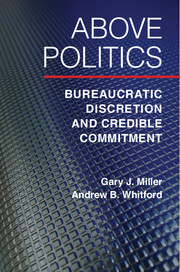Book contents
- Frontmatter
- Contents
- Preface
- Acknowledgments
- 1 Introduction
- 2 The Moral Hazard of Bureaucrats and Politicians
- 3 Political Moral Hazard and Credible Commitment
- 4 Political Moral Hazard and Bureaucratic Autonomy
- 5 “Above Politics”: The Separation of Powers and Bureaucratic Autonomy
- 6 The Control Paradox, Trust, and Leadership
- 7 Professionalism and Credible Commitment
- 8 The Politicization of Financial Regulation
- 9 The Financial Crisis and Reregulation
- 10 Conclusion: The Unraveling of Dodd-Frank
- Works Cited
- Index
- Other books in the series (Series List Continued from page ii)
2 - The Moral Hazard of Bureaucrats and Politicians
Published online by Cambridge University Press: 05 May 2016
- Frontmatter
- Contents
- Preface
- Acknowledgments
- 1 Introduction
- 2 The Moral Hazard of Bureaucrats and Politicians
- 3 Political Moral Hazard and Credible Commitment
- 4 Political Moral Hazard and Bureaucratic Autonomy
- 5 “Above Politics”: The Separation of Powers and Bureaucratic Autonomy
- 6 The Control Paradox, Trust, and Leadership
- 7 Professionalism and Credible Commitment
- 8 The Politicization of Financial Regulation
- 9 The Financial Crisis and Reregulation
- 10 Conclusion: The Unraveling of Dodd-Frank
- Works Cited
- Index
- Other books in the series (Series List Continued from page ii)
Summary
The “political master” finds himself in the position of the “dilettante” who stands opposite the “expert.”
– Max Weber (Weber, Gerth, & Mills, 1958, 232)The fact that when there are asymmetries of information, markets are not, in general, constrained Pareto efficient implies there is a potentially important role for government.
– Joseph Stiglitz (Stiglitz, 2002, 516)PICKING WINNERS AND LOSERS
In 2008, Andimuthu Raja, then Indian Minister for Communication and Information Technology and Member of Parliament, was charged with the task of allocating licenses for companies to use those parts of the electromagnetic spectrum that are capable of carrying radio frequencies – specifically, the spectrum that could support 2G mobile telecommunications services. The stakes were enormous. Consumers would benefit through text messaging, and digital encryption of calls meant that more people could be served (Qi, Zysman, & Menkes, 2001). The growing demand for data services and an expanding market base meant that providers would also gain. Many expected India to be the world's second largest mobile broadband market by 2016 (ASA & Associates, 2012).
In such situations economists and politicos may have different goals. Granting access to the spectrum can be financially rewarding for politicos. For economists, in contrast, the goal is to allocate access to the spectrum in a way that reveals its true price when there is no natural market. Usually, they suggest that auctions be held to set the price and, as a consequence, maximize the revenue the government receives from sharing access to that scarce resource. Most of the robust debate about designing and implementing auctions focuses on ensuring that the public benefits from the private use of a public good (Klemperer, 2002).
Economists know a lot about designing efficient institutions for granting access to the spectrum, largely from the experiences of the United States and other countries. For instance, economists such as Ronald Coase argued for radio spectrum auctions as early as 1959. The Federal Communications Commission has held auctions since 1994, and many other countries auctioned access to the electromagnetic spectrum throughout the early 2000s. Economists have come to believe that most problems can be solved through good market designs – that “good auction design is mostly good elementary economics” (Klemperer, 2002, 170).
- Type
- Chapter
- Information
- Above PoliticsBureaucratic Discretion and Credible Commitment, pp. 24 - 52Publisher: Cambridge University PressPrint publication year: 2016



